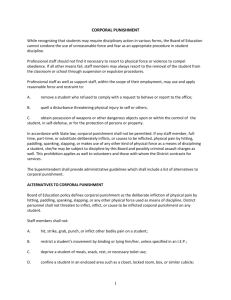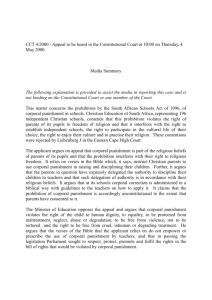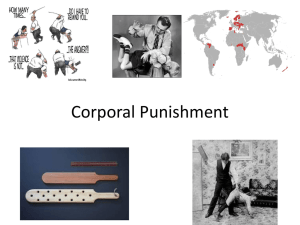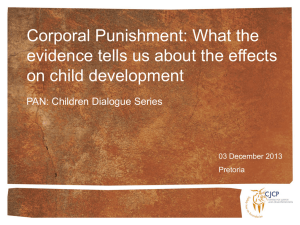Corporal Punishment of children in Philippines
advertisement
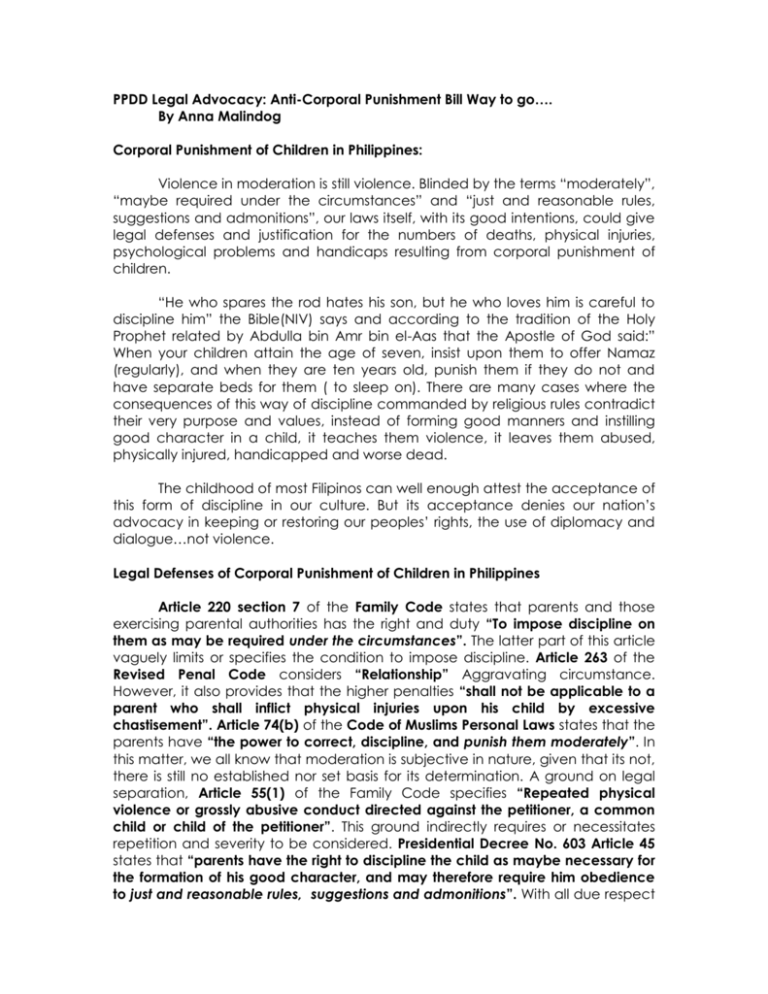
PPDD Legal Advocacy: Anti-Corporal Punishment Bill Way to go…. By Anna Malindog Corporal Punishment of Children in Philippines: Violence in moderation is still violence. Blinded by the terms “moderately”, “maybe required under the circumstances” and “just and reasonable rules, suggestions and admonitions”, our laws itself, with its good intentions, could give legal defenses and justification for the numbers of deaths, physical injuries, psychological problems and handicaps resulting from corporal punishment of children. “He who spares the rod hates his son, but he who loves him is careful to discipline him” the Bible(NIV) says and according to the tradition of the Holy Prophet related by Abdulla bin Amr bin el-Aas that the Apostle of God said:” When your children attain the age of seven, insist upon them to offer Namaz (regularly), and when they are ten years old, punish them if they do not and have separate beds for them ( to sleep on). There are many cases where the consequences of this way of discipline commanded by religious rules contradict their very purpose and values, instead of forming good manners and instilling good character in a child, it teaches them violence, it leaves them abused, physically injured, handicapped and worse dead. The childhood of most Filipinos can well enough attest the acceptance of this form of discipline in our culture. But its acceptance denies our nation’s advocacy in keeping or restoring our peoples’ rights, the use of diplomacy and dialogue…not violence. Legal Defenses of Corporal Punishment of Children in Philippines Article 220 section 7 of the Family Code states that parents and those exercising parental authorities has the right and duty “To impose discipline on them as may be required under the circumstances”. The latter part of this article vaguely limits or specifies the condition to impose discipline. Article 263 of the Revised Penal Code considers “Relationship” Aggravating circumstance. However, it also provides that the higher penalties “shall not be applicable to a parent who shall inflict physical injuries upon his child by excessive chastisement”. Article 74(b) of the Code of Muslims Personal Laws states that the parents have “the power to correct, discipline, and punish them moderately”. In this matter, we all know that moderation is subjective in nature, given that its not, there is still no established nor set basis for its determination. A ground on legal separation, Article 55(1) of the Family Code specifies “Repeated physical violence or grossly abusive conduct directed against the petitioner, a common child or child of the petitioner”. This ground indirectly requires or necessitates repetition and severity to be considered. Presidential Decree No. 603 Article 45 states that “parents have the right to discipline the child as maybe necessary for the formation of his good character, and may therefore require him obedience to just and reasonable rules, suggestions and admonitions”. With all due respect to everyone’s judgment of what is just and reasonable, to everyone’s way of suggestion and admonition, there are cases that show that not all that has parental authorities has parental love and care as well. The United Nations Convention on the Rights of the Child, ratified in 193 countries including Philippines, Article 19 requires all States to make “all appropriate legislative, administrative, social and educational measures to protect child from all forms of physical or mental violence, injury or abuse, neglect or negligent treatment, maltreatment or exploitation including sexual abuse, while in the care of parent(s), legal guardians(s) or any who has the care of the child…”. Conformation to such international laws advocating Children’s rights is not purposed to meet international standards but to adopt principles which better exemplifies understanding of these rights, thus enabling us to give them due respect and make necessary measures to protect them with all our means. Justification of Corporal Punishment of children To justify an act by its moderation or frequency, by culture or beliefs will never suffice to justify its consequences, desired or not, meant or unintentional. In a focused-group discussion (FDG) for children aged 6 to 15 years old conducted by Children’s Legal Advocacy Network (CLAN), Inc. in the different areas in Metro Manila, 89% claimed to be victims of corporal punishment. 3% said they almost wanted to end their lives after being punished. Majority claimed that the physical abuses happen almost everyday. A research conducted by Save the Children in the Philippines in 2005, shows 85% of almost all children interviewed claimed they are physically punished in the home. 65% of which said they are being spanked; 72% verbalized their emotional hurt after being punished. Researchers show that this way of discipline produces anger, resentment and low self esteem in children which can affect their later life. It also teaches them that violence is an acceptable behavior and is a solution to problems. Corporal punishment kills thousands of children each year and injures and handicaps many more according to the World Health Organization in 2002 World Health Report on Violence and Health. The truth can speak for itself. The consequences of corporal punishment speak of its justice and morality. Why need a separate law of Anti Corporal Punishment of children in Philippines We recognize the unquestionable intention of our laws, but issues arising from cases that shows their inadequacy and lack of specification in protecting children’s rights remains unanswered and unresolved. There is an obvious need of a law which will not justify in anyway nor shall just limit or give parameters but explicitly stop corporal punishment, give justice to its victims and adequate protection to children’s rights and welfare. What shall we do? Children’s Legal Advocacy Network (CLAN) unites in creating awareness and campaigning for the enactment of law that will explicitly ban corporal punishment and repeal any existing law or legal defenses of justification for the corporal punishment of children in whatever form and in all settings. This law should also encompass the establishment of training programs and 5comprehensive education of parents and all who has parental authorities on positive and non-violent forms of discipline and child rearing. It should also empower and establish community-based child protection systems which are often neglected and leaves law enacted but not enforced. Create awareness of the Abuse and Injustice resulting from Corporal Punishment of children and their short term as well as long term effect on them. . By letting the people see the real situation of children victims of corporal punishment, this could be a preventive measure helping people not just to stop its practice but be advocates of children’s rights. Educate parents and those with parental authorities on how practice positive and non-violent ways to discipline and promote its good effects to their children. Giving weight to the fact that corporal punishment is part our culture or habits if you may, according to psychology, one of the best ways to break bad habits is to replace them with new ones. Educating the people with positive and non-violent way of disciplining a child and presenting its advantages and rewards will encourage its practice and eventually help people stop the practice of corporal punishment. Involve Children and Parents in the development of policies and programs. Having the perspective not only of children but of possible offenders’ as well is important in developing policies and programs that would respond to corporal punishment. Involving people concern in the development of these policies and programs would help us win their cooperation. Considering that the children will mostly benefit from these policies and programs, it still stands that their primary target are the parents and those with parental authorities, making their involvement essential.


